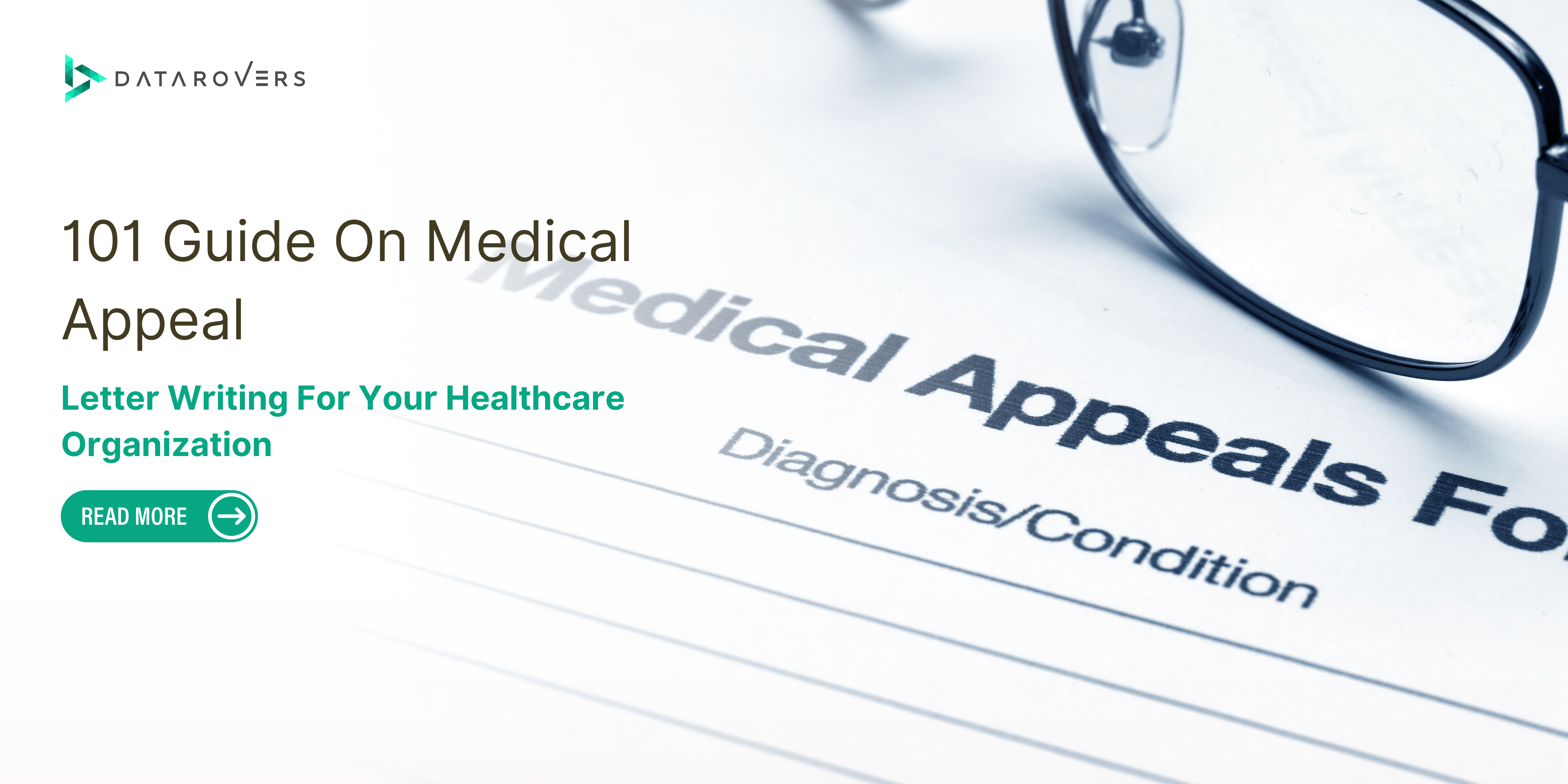Overview
Proactively fighting denied claims is the new standard and recognizing how to craft a compelling medical appeal letter is necessary in current US healthcare dynamics. As denials and disputes about claims are unavoidable, being able to write persuasive medical appeal letters is essential for helping your organization stand up for patients and get the necessary coverage. This skill not only ensures that patients get the care they need but also improves the overall efficiency and effectiveness of healthcare operations.
Moreover, mastering the art of medical appeal letter writing empowers your healthcare organization to advocate effectively for patients and navigate the complexities of insurance coverage. By understanding the different types of appeals, and adhering to effective formatting, you can significantly increase your success rate in securing the necessary coverage for your patients.
This comprehensive guide helps you to better understand the complexities of medical appeal letters, also equipping you with the knowledge and strategies to excel in the appeals process.
Understanding the Importance of Medical Appeal Letters
Medical bills can be complicated, and at times, insurance companies may reject claims that can add more complication. This can leave patients dealing with unexpected financial burdens and hinder their access to vital healthcare services. Medical appeal letters are an important tool for healthcare organizations to challenge claim denials and ensure that patients receive the necessary care.
A well-written appeal letter can:
Clarify misunderstandings
Often, denials stem from missing information or misinterpretations of medical records. An appeal letter provides an opportunity to rectify these issues and present a clear picture of the patient’s needs.
Advocate for Medical Necessity
Appeals allow healthcare organizations to demonstrate the medical necessity of a denied service or treatment. This involves presenting evidence that the service aligns with established medical standards and is crucial for the patient’s well-being.
Secure Fair Coverage
By effectively contesting a denial, healthcare organizations work towards ensuring patients receive the coverage they are entitled to under their insurance plans.
Well-Written Healthcare Appeal vs. Insufficient Healthcare Appeal
|
Features
|
Well-Written Appeal
|
Insufficient Appeal
|
|
Introduction
|
Clearly states the purpose (appeal) and identifies the specific decision being appealed.
|
Vague or missing introduction. Doesn’t explain the situation.
|
|
Background Information
|
Provides a concise but clear explanation of the patient’s medical history, relevant diagnosis, and treatment plan.
|
Lacks details or goes off on tangents not related to the appeal.
|
|
Reason for Appeal
|
Clearly states why the decision is wrong and how it negatively impacts the patient’s health. Uses specific details and evidence (doctor’s notes, test results) to support the claim.
|
Makes vague statements about the decision or focuses on emotional appeals without proof.
|
|
Request
|
Clearly states the desired outcome of the appeal (e.g., coverage approval, specific treatment).
|
Makes a general request or doesn’t clearly state what the desired action is.
|
|
Supporting Documents
|
Includes relevant medical records, doctor’s letters, or other documentation that strengthens the appeal.
|
Lacks supporting evidence or includes irrelevant documents.
|
|
Tone
|
Professional, respectful, and focused on the facts of the case.
|
Uses emotional manipulation, threats, or blames the healthcare provider.
|
|
Conclusion
|
Summarizes the key points of the appeal and reiterates the desired outcome.
|
Lacks a clear conclusion or repeats information already stated.
|
|
Formatting
|
Easy to read with clear headings, concise paragraphs, and proper grammar.
|
Difficult to understand due to poor formatting, typos, or grammatical errors.
|
Types of Medical Appeal Letters
Depending on the timing of the denial, there are three main categories of medical appeal letters:
Direct Claim Denial Appeal Letter:
This is the most common type of appeal letter written after you receive a notice from your insurance company denying coverage for a specific claim. It directly addresses the reasons outlined in the denial and argues why your claim should be reconsidered for approval.Here’s what to include in your Direct Claim Denial Appeal Letter:Claim Details: Clearly state the specifics of the denied claim, including:
- Policyholder Name and Policy Number
- Date of Service
- Type of Service or Treatment Billed
- Name of Provider who rendered the Service
- Claim Reference Number (if provided by the insurance company)
Reason for Denial: Briefly state the reason for denial as outlined in the insurance company’s explanation of benefits (EOB).Your Argument for Coverage: This is the core of your appeal. Here you will explain why you believe the claim should be covered. This may involve:
- Referencing specific policy language that supports coverage for the service.
- Provide additional medical documentation from your doctor that clarifies the medical necessity of the service.
- Highlighting any errors or misunderstandings in the claim processing.
Request for Reconsideration: Clearly state your request for the insurance company to re-evaluate the claim and approve coverage.
Pre-Service Appeal Letter:
If you anticipate a potential denial for a planned service or treatment, a pre-service appeal letter can be a proactive approach. This helps clarify coverage expectations before the service is rendered and avoids potential delays in receiving care.
Here’s what to include in your Pre-Service Appeal Letter:
- Policyholder Information: Your name and policy number.
- Planned Service or Treatment: Clearly describe the service or treatment you are considering and why it’s necessary.
- Medical Necessity: Justify the service, including a doctor’s referral or explanation of how the service addresses your medical condition.
- Prior Authorization Request (if applicable)If your plan requires prior authorization for the service, request it in the letter and include any relevant medical records.
- Request for Coverage Determination: Clearly state your request for the insurance company to determine coverage for the planned service before you proceed.
Post-Service Appeal Letter:
Claim Details: Similar to the Direct Appeal Letter, include details about the service, provider, and claim reference number.
Reason for Denial: State the reason for denial provided by the insurance company.
Justification for Medical Necessity: Provide strong evidence to support the medical necessity of the service. This may involve:
- Including a detailed doctor’s letter explaining the urgency and necessity of the performed service.
- Attaching medical records that document your condition and the treatment plan.
- Highlighting any efforts made to obtain pre-authorization if applicable.
- Request for Reconsideration: Request the insurance company to re-evaluate the claim based on the provided documentation.
Crafting an Effective Medical Appeal Letter Format
A well-structured appeal letter significantly increases your chances of success. Here’s a breakdown of the key elements to include:
Clear Introduction
- State the letter’s purpose – mention that it’s an appeal of a claim denial.
- Briefly introduce the patient by name and include their insurance policy information.
- Provide a concise overview of the service or treatment in question.
Detailed Body
- Explain the Denial: Briefly acknowledge the reason for the denial as stated by the insurance company.
- Present Your Case: This is the heart of your appeal. Here, you meticulously address the denial points with clear and concise arguments.
- Medical Necessity: Demonstrate why the denied service or treatment is medically necessary for the patient’s specific condition.
- Supporting Evidence: Include relevant medical records, doctor’s notes, diagnostic test results, and any other documentation that strengthens your claim.
- Industry Standards: If applicable, reference relevant medical guidelines or published studies to support the medical necessity of the service.
- Maintain a Professional Tone: Express your arguments persuasively yet respectfully. Avoid accusatory language or emotional pleas.
Well-Articulated Conclusion
- Summarize the key points of your appeal, reiterating the medical necessity of the service.
- Restate your request for coverage reconsideration.
- Provide your contact information for further communication or questions the reviewer may have.
- Consider adding a call to action by inviting the reviewer to reach out to your organization for additional information or clarification.
Additional Tips for Successful Appeals
Timeliness is Key: Each insurance company has a specific timeframe for submitting appeals. Ensure you adhere to these deadlines to avoid missing out on your chance for reconsideration.
Organization is Essential: Keep all relevant documents – claim details, medical records, and supporting evidence – well-organized for easy reference during the appeal process.
Why Appeal Software Wins the Fight for Your Healthcare Rights?
While you have the right to write your healthcare appeal, appeal software can be your secret weapon in getting the coverage or treatment you deserve.
Here’s how:
|
Feature
|
Traditional Manual Appeal
|
Appeal Software Advantage
|
|
Time Commitment
|
Slow Appeal process:
Hours spent researching, writing, editing
|
Faster Appeals: Templates, and pre-written sections save you time. Focus on your specific situation.
|
|
Accuracy & Clarity
|
Human Errors: Relies on your healthcare & appeal knowledge
|
Reduce Errors: Built-in checks catch typos & ensure key points are included. Pre-populated information improves accuracy.
|
|
Confidence in the Process
|
Expertise Required: Requires deep understanding of appeals
|
Be Informed & Guided: Basic explanations within the software empower you. Focus on the details while the software handles the structure.
|
|
Strength of Your Appeal
|
Lack of Effectiveness: May miss crucial elements or lack persuasiveness
|
Craft a Compelling Case: Templates ensure you cover everything important. Error checks & clear structure present your case professionally.
|
|
Peace of Mind
|
Stressful: Feeling overwhelmed by the process
|
Stress-Free Approach: Software guides you step-by-step, reducing anxiety. Focus on getting the care you need.
|
How Smart Appeals Is An Ideal Healthcare Appeal Software?
Smart Appeals is a generative AI-powered solution by DataRovers that not only ensures the fastest healthcare appeal process but also makes it easier yet accurate. DataRovers’ smart appeals software plays three crucial roles in the healthcare appeal process:
Automate Medical Appeal Letter Writing
Smart Appeal writes a well-articulated medical appeal letter with the help of generative AI technology. The appeal letter generated by DataRovers appeal software ensures the most suitable format that compliments your denial case. In addition to this appeal, the letter generated by Smart Appeals software is error-free and has the efficiency to win the appeal case.
Auto-Populate the Payor Appeal form
Most commonly, appeals get rejected due to missing information or wrong user information on the payor appeal form. In order to facilitate practitioners and their patients datarovers medical appeal software automatically fills the essential fields in payor appeal forms and helps to minimize the chances of these common human errors.
Auto Attach Supporting Documents
Missing evidence documents is the most influencing factor leading to appeal. Smart appeals have an amazing feature in which you can auto-attach the evidence document quickly and easily. Imagine Less time struggling and more time focusing on your health. Appeal software like Smart Appeals empowers you to take control and fight for the coverage you rightfully deserve.Appeal software doesn’t replace your voice, it amplifies it. With its help, you can present a clear, well-structured appeal that gets the attention it deserves. So, Are You Ready to Win Your Next Healthcare Appeal? Start writing your medical appeal letter with Smart Appeals!




